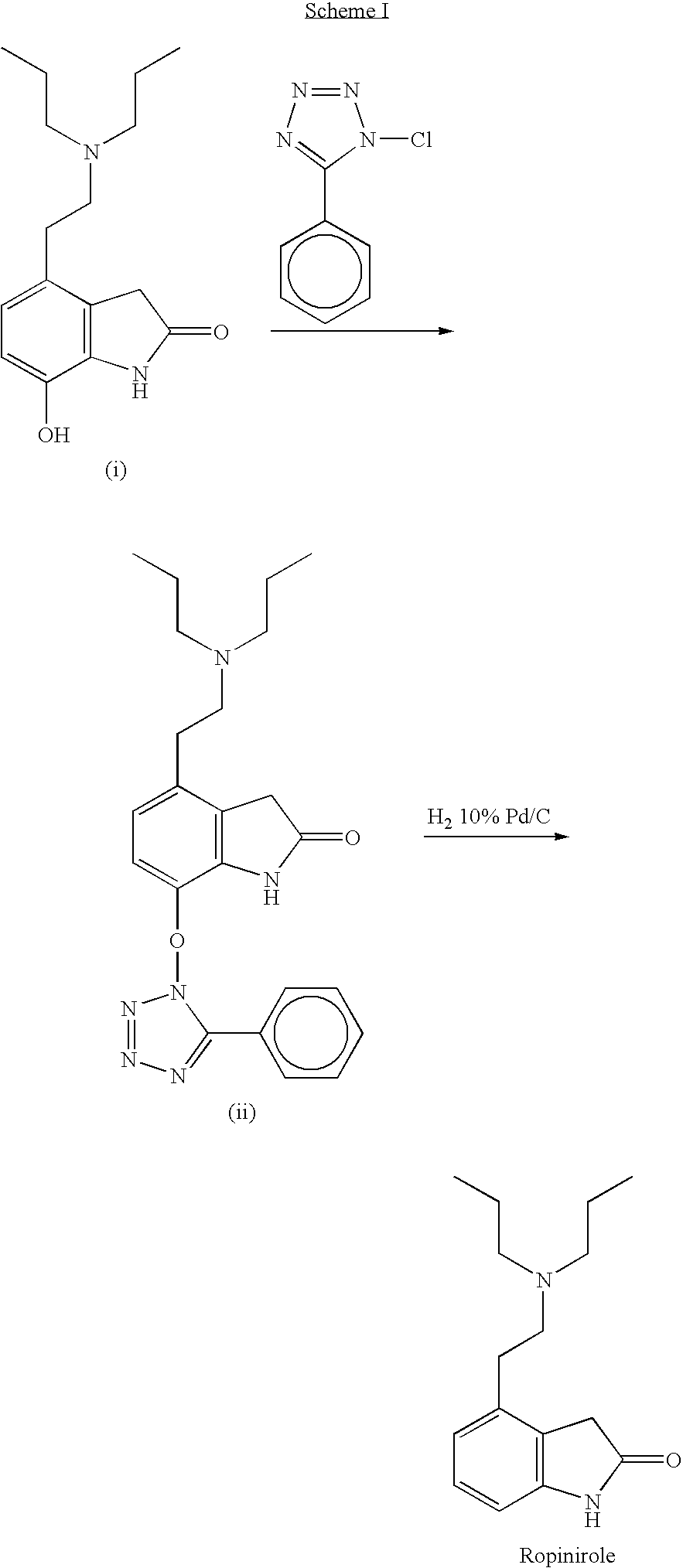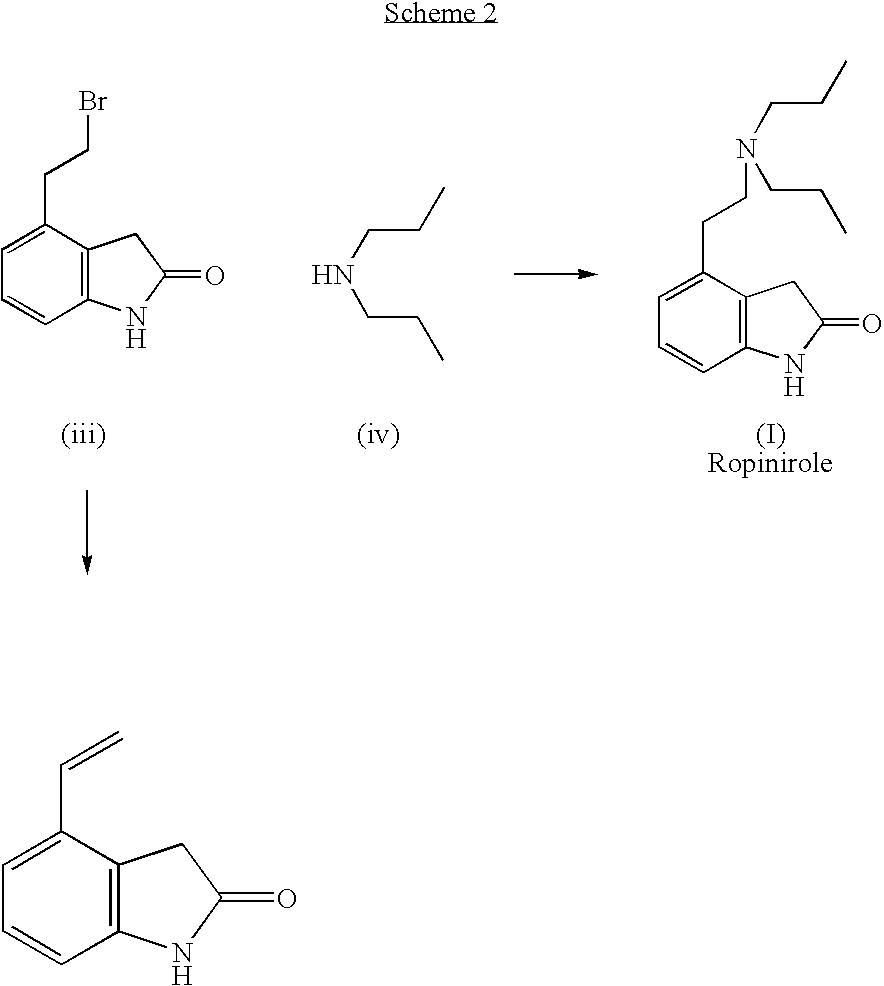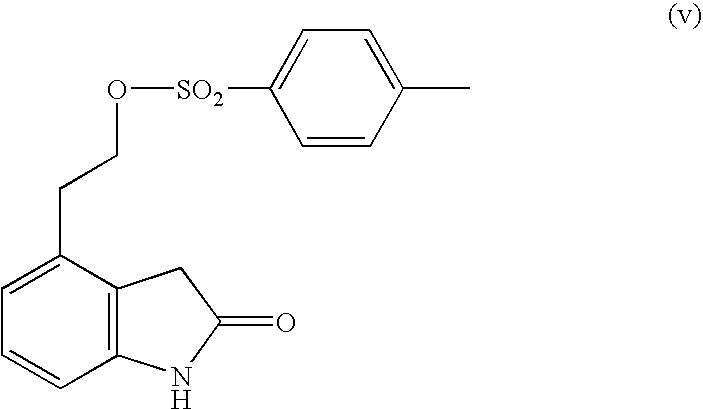Process for the preparation of 4-(2-dipropylaminoethyl)-1,3-dihydro-2H-indol-2-one hydrochloride
- Summary
- Abstract
- Description
- Claims
- Application Information
AI Technical Summary
Benefits of technology
Problems solved by technology
Method used
Image
Examples
example 1
Preparation of 2-(2′-phthalmidoethyl) Benzaldehyde (III)
[0027] To a stirred suspension of potassium phthalimide (1.3 Kg, 7 mol) in DMSO (2.5 L), at 110° C., was added 2-(2′-bromoethyl) benzaldehyde (1 Kg, 4.69 mol) added through a dropping funnel over the period of 0.5 hr. The reaction mixture was then stirred at 110° C. for 2.5 hr and cooled to room temperature before being added over the period of 0.5 hr in water (7.5 L). The cream colored solid was filtered at suction, washed with water till neutral and dried overnight at 70° C. This gave the title compound, 1.07 Kg (81.6%) in the form of off white solid.
[0028] MS-m / z M+H=280
[0029] NMR (200 MHz) DMSO d 3.43 (t, 2H, CH2-Ar); d 4.0 (t, 2H, CH2N); d 7.25-7.89 (m, 8H, Ar—H); d 10.27 (s, 1H, —CHO).
example 2
Preparation of 2-(2′-phthalimido Ethyl) β-nitrostyrene (IV)
[0030] To a stirred suspension of 2-(2′-phthalimidoethyl) benzaldehyde (900 gm, 3.22 mol), in methanol (9.0 Lt) were added nitromethane (521 ml, 9.65 mol), acetic acid (349 ml, 6.1 mol), n-butyl amine (486 ml, 4.72 mol) and trimethyl orthoformate (499 ml, 3 mol) at room temperature. The reaction mixture was then stirred at 30-40° C. for 30 hrs. The greenish coloured solid was filtered at suction, washed with chilled methanol (700 ml) and dried at 50° C. for 8 hrs. This gave the title compound, 649 gm, (62.5%) in the form of cream coloured solid
[0031] MS-m / z M+H=323.
[0032] NMR (200 MHz) DMSO; d 3.17 (t, 2H, CH2-Ar); d 3.91 (t, 2H, CH2N); d 7.26-7.64 (m, 8H Ar—H); d 8.39 (d, 2H, CH═CH).
example — 3
Example—3
Preparation of 4-(2′-phthalimidoethyl)-3-chloro-1,3-dihydro-2H-indol-2one (V)
[0033] To a stirred solution of 2-(2′-phthalmido ethyl)-β-nitrostyrene (25 gm 0.0776 mol) in dichloromethane (500.0 ml) was added Ferric chloride (62.5 gm, 0.385 mol) at room temperature. The reaction mass was cooled to 3° C. and to it was charged valeryl chloride (25 ml, 0.206 mol). The reaction mixture was then stirred at 2-5° C. for 24 hrs before being added to ice cold water (750 ml). The quenched reaction mixture was stirred at 5° C. for 1 hr before being filtered. The yellow solid was isolated at suction, washed with chilled water (2 Lt) and dried at 50 DC for 14 hrs. This gave the title compound, 14 gm, (53%) in the form of cream coloured solid.
[0034] MS-m / z M+H=341
[0035] NMR (200 MHz) DMSO; d 3.07 (t, 2H, CH2-Ar); d 3.99 (t, 2H, CHz-N); d 5.7 (s, 1H COCH)
[0036] d 6.83 (d, 1H, Ar—H); d 6.95 (d, 1H, Ar—H); d 7.29 (t, 1H, Ar—H); d 7.9 (s, 4H, ArH); d 10.85 (s, 1H, NH).
PUM
| Property | Measurement | Unit |
|---|---|---|
| Fraction | aaaaa | aaaaa |
| Fraction | aaaaa | aaaaa |
| Fraction | aaaaa | aaaaa |
Abstract
Description
Claims
Application Information
 Login to View More
Login to View More - R&D
- Intellectual Property
- Life Sciences
- Materials
- Tech Scout
- Unparalleled Data Quality
- Higher Quality Content
- 60% Fewer Hallucinations
Browse by: Latest US Patents, China's latest patents, Technical Efficacy Thesaurus, Application Domain, Technology Topic, Popular Technical Reports.
© 2025 PatSnap. All rights reserved.Legal|Privacy policy|Modern Slavery Act Transparency Statement|Sitemap|About US| Contact US: help@patsnap.com



